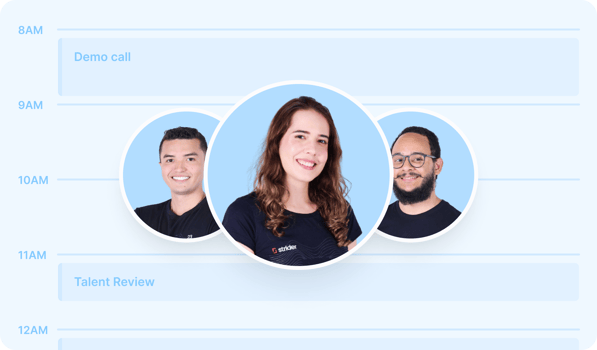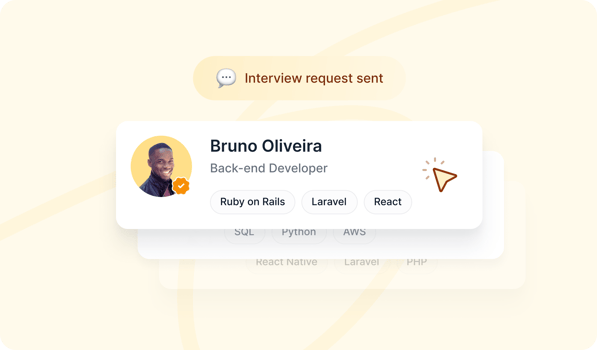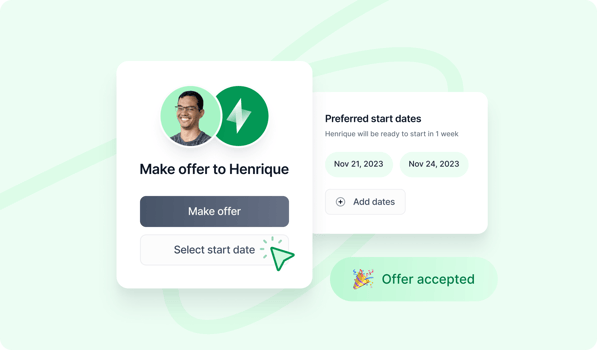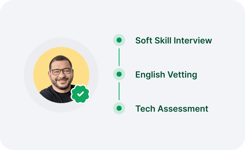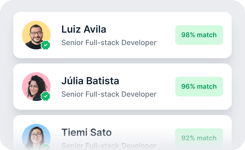Hire Remote Ionic Developers
Ionic development has emerged as a popular choice for building high-quality, cross-platform mobile apps using web technologies. With its robust set of tools and plugins, the Ionic mobile application framework enables app developers to create feature-rich and highly interactive apps that can run seamlessly on both iOS and Android devices.
Ionic has an extensive set of pre-built UI components and themes, making it easier for developers to build visually appealing apps quickly. The ionic framework also offers a range of plugins and integrations, allowing developers to add functionalities like social media logins, push notifications, and more without writing complex code from scratch. Additionally, Ionic's command-line interface (CLI) streamlines development by automating routine tasks, while its Live Reload feature enables developers to see changes in real time during Ionic app development.
With these powerful features and more, it's no wonder that Ionic has become a favorite among developers worldwide. So, if you're looking to create a standout app, hire dedicated ionic developers from all over the world.
What to look for when hiring Ionic Developers?
Technical Skills
Here are 5 key technical skills that you should look for when you're planning to hire ionic developers:
- Strong proficiency in web technologies: Ionic is built on web technologies like HTML, CSS, and JavaScript, so it's essential to hire Ionic developers who are highly proficient in these areas.
- Expertise in the Angular framework: Angular is the backbone of Ionic, so it's important that your Ionic app developers have a deep understanding of the framework. The developer should be familiar with the core concepts of Angular, such as dependency injection, data binding, and component-based architecture.
- Experience with hybrid mobile app development: Building a high-quality hybrid mobile app requires a deep understanding of the process and best practices to follow. The developer should be familiar with key concepts like responsive design, app performance optimization, and mobile-specific user experience (UX) considerations.
- Familiarity with software testing and debugging: The ability to test and debug software is critical for any software developer, and Ionic development is no exception. Hire ionic developers who understand the importance of writing testable code.
- Experience with Git and version control: Git is an essential tool for modern software development, and your Ionic developers should be well-versed in its use.
Certifications
Professional certifications can help you in shortlisting the best Ionic programmers by demonstrating their proficiency with the Ionic framework and related technologies.
- Ionic Framework Certification: This certification is offered by Ionic and demonstrates proficiency in building cross-platform mobile apps with the Ionic Framework. To earn this certification, the candidate needs to pass a written exam that covers topics like Ionic CLI, Angular, and Cordova.
- Angular Certification: Since the Ionic Framework is built on top of Angular, it can be useful to have a certification in Angular as well. The Angular team offers a certification program that covers topics like components, services, and observables.
While certifications aren't always necessary to demonstrate the candidate's proficiency as an Ionic developer, they can be a useful way to differentiate yourself and demonstrate the candidate's commitment to ongoing learning and development.
Portfolio
When evaluating the portfolio of an Ionic developer, there are a few critical aspects that you should consider to determine their skill level and experience.
Here are a few things to look for:
- Quality of code: Look for evidence that the developer writes clean, well-organized, and maintainable code. This might include evidence of good architecture, consistent naming conventions, and proper use of comments and documentation.
- User interface (UI) and user experience (UX) design: In addition to the quality of the code, evaluate the quality of the apps' UI and UX design. The interface should be well-designed and intuitive that provides a great user experience.
- Performance: Evaluate the performance of the apps the developer has built. Make sure the mobile apps are fast, responsive, and optimized for mobile devices.
- Features and functionality: Features and functionalities should include integration with third-party APIs, use of native device features like the camera or GPS, or use of advanced UI components.
- Code samples and GitHub repositories: Finally, look for evidence that the developer is active on GitHub and other code-sharing platforms. Look for code samples and open-source projects that the Ionic app developer has contributed to, as well as evidence that they are active in the Ionic or Angular developer communities.
Soft Skills
- Communication skills: Ionic app developers need to be able to communicate effectively with clients, team members, and stakeholders. This includes the ability to explain technical concepts in non-technical terms, provide regular updates on project progress, and actively listen to feedback and concerns.
- Problem-solving skills: Experienced Ionic developers often need to solve complex technical problems, whether it's debugging code, addressing performance issues, or integrating with third-party APIs. They need to be able to approach problems methodically, break them down into manageable pieces, and find creative solutions.
- Collaboration skills: Best ionic developers often work as part of a team, so it's important that they are able to collaborate effectively. This includes the ability to share code and work on projects using version control systems like Git, provide and receive constructive feedback, and work collaboratively to solve problems.
Top 5 Ionic Interview Questions
What is Capacitor in Ionic, and how does it differ from other native mobile development solutions like React Native or Xamarin?
This question is important to assess the candidate's understanding of the key component of the Ionic framework. Understanding the role of the Capacitor is important for Ionic developers to create high-performance, cross-platform mobile apps. Moreover, comparing Capacitor with other native mobile development solutions (React Native or Xamarin) provides a better understanding of the pros and cons of different development approaches.
A good answer to this question should start with a brief explanation of what Capacitor is and how it differs from other native mobile development solutions like React Native and Xmarin. The answer should highlight that Capacitor is an open-source, cross-platform runtime that allows developers to build native mobile apps using web technologies such as HTML, CSS, and JavaScript.
How does Ionic handle platform-specific features?
This question is important to assess the candidate's knowledge of Ionic's ability to handle platform-specific features, which is critical for developing high-quality hybrid apps that meet the user's expectations.
Knowledgeable Ionic app developers should be able to explain that Ionic uses a plugin system to interact with the native capabilities of the device, such as the camera, GPS, or Bluetooth. They should also be able to discuss the differences between Ionic's Cordova plugins and Capacitors, and which is best suited for different use cases.
What are the differences between AngularJS and Angular?
This question is important to assess the candidate's familiarity with Angular, which is the underlying framework that powers this Framework. A strong candidate should be able to explain that AngularJS is the first version of Angular, which uses a two-way data binding approach, while Angular is the modern version that uses a reactive approach and is optimized for mobile devices. They should also be able to discuss the key differences between the two versions, including syntax, performance, and tooling.
How does lazy loading work in Ionic?
This question is important to assess the candidate's understanding of how Ionic optimizes app performance by using lazy loading, which is a technique used to load modules on demand rather than all at once.
A strong candidate should be able to explain that lazy loading works by breaking the app into smaller modules, each with its own routing configuration. They should also be able to discuss the benefits of using lazy loadings, such as faster app startup times, reduced memory usage, and improved user experience.
What is the difference between observables and promises?
This question evaluates the developer's knowledge of two fundamental Ionic programming concepts used in the development: observables and promises.
Expert ionic app developers should be able to explain that both observables and promises are used for handling asynchronous operations but with different approaches. They should also be able to discuss the key differences between the two, including how they handle errors, how they manage multiple events, and when to use each one in different contexts.


